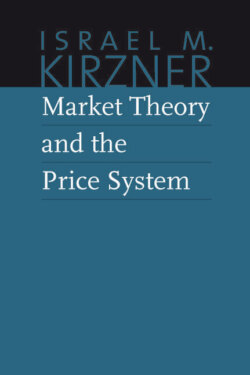Читать книгу Market Theory and the Price System - Israel M. Kirzner - Страница 51
На сайте Литреса книга снята с продажи.
MARGINAL UTILITY AND THE CONDITIONS FOR EXCHANGE
ОглавлениеThe utility analysis discussed in this chapter provides a framework within which to understand the emergence of exchange between individuals. Interpersonal exchange is the essence of the market process, and market theory is devoted to the explanation of the way objects will be produced for exchange, the quantities that will be offered for exchange, and the rates at which different exchanges will take place. Here we analyze the basic conditions that exist when two individuals exchange goods. This analysis will be fundamental to much of the subsequent material in this book.
The conditions for exchange exist between two individuals A, B, whenever a specific quantity of a good possessed by A is ranked lower on his value scale than a specific quantity of a good possessed by B, while the ordering is the reverse on B’s value scale. That is, wherever the marginal utility of a quantity of one good possessed by A is lower for A than that of a quantity of another good possessed by B, while for B the marginal utility of the latter quantity is the lower, then each of the two gain by giving up what is less important to him in exchange for what is more important.
If these conditions are absent, no exchange can take place. It is not sufficient that A ranks B’s brand new automobile higher than his own ancient jalopy; if B concurs in A’s relative valuation, both vehicles will remain where they are. No exchange will take place freely unless each party believes that he will be better off having made the exchange. This fundamental and self-evident truth is the central theme of the market process and of its theory.
The implications of these conclusions are far reaching. Where two men each possess both of two goods, then, as we have seen, any difference in the rankings that specific quantities of the two goods occupy on the value scales of the two men will result in exchange if the two men are “in the same market” (that is, if they are each in contact with the other and aware of the other’s relative ranking). This is so because it will benefit each man to give some of the good he values less for some of the good he values more. A state of rest, where both men, although in the same market, do not barter, can exist therefore only when both men rank both goods in the same order on their individual scales of value. But if this is so for two goods, it is so for any two goods. Thus, for two men to be in a state of rest with respect to each other, each must rank the marginal quantities of all the goods, which both possess, in exactly the same order as does the other.
Moreover, if this is the condition for absence of exchange between two men, it must be so also for any two men. Thus, for a market to be at rest, each participant in a market must rank each one of the goods he possesses in exactly the same order of significance, at the margin, as does every other participant in the market.
To put the same proposition in a different and more useful form, in any market a tendency will exist for each participant to barter in the marketplace so long as the relative marginal utilities to him of all the goods he possesses is in anyway different from those of any other participant with respect to those that he possesses. As each participant exchanges, the marginal utility of given quantities of the goods that he sacrifices rises (in accordance with the law of diminishing utility), while that of given quantities of the goods that he acquires correspondingly falls. The process of exchange thus raises those marginal utilities that had been relatively low (that is, of the goods that the owners for this reason wished to sell) and lowers those marginal utilities that had been relatively higher (that is, of the goods that the owner for this reason wished to buy). Hence, as the exchange process continues, the value scale of each member of the market tends toward consistency with that of every other member, with respect to the goods possessed by each member.
As men’s tastes change, as for various reasons the quantities and kinds of the commodities and services each man possesses change, the relative marginal utilities of the goods he possesses alter for each participant in the market and thus, again and again, diverge from the rankings of other participants. There is thus constant recurrence of opportunities for each participant to exchange profitably.
The rates exchanges will take place at, of course, are closely bound up with the degree of divergence between the value scales of different participants. These are matters that will concern us in later chapters. Our discussion has been carried on in barter terms consistent with our assumption that exchange is carried on with the assistance of a medium of exchange that only facilitates, and in no way distorts, the expression by men of their relative valuations of real goods and services.
